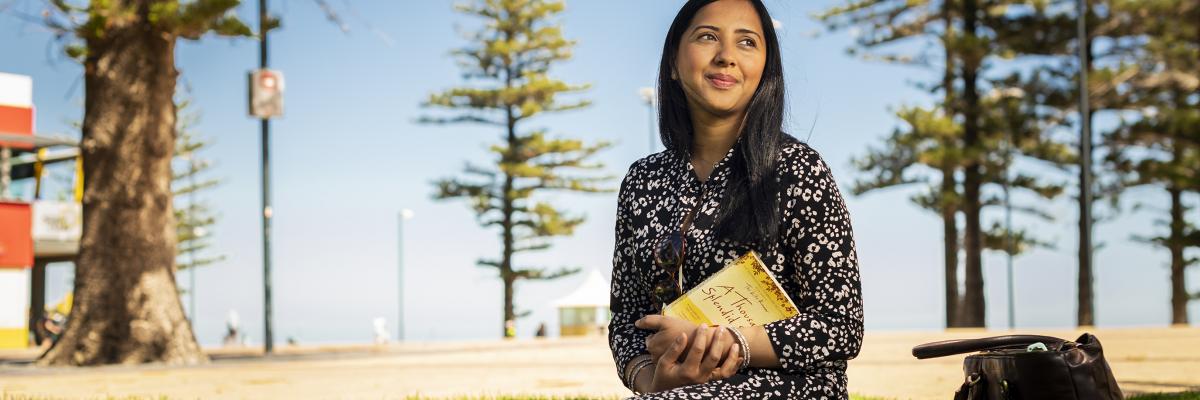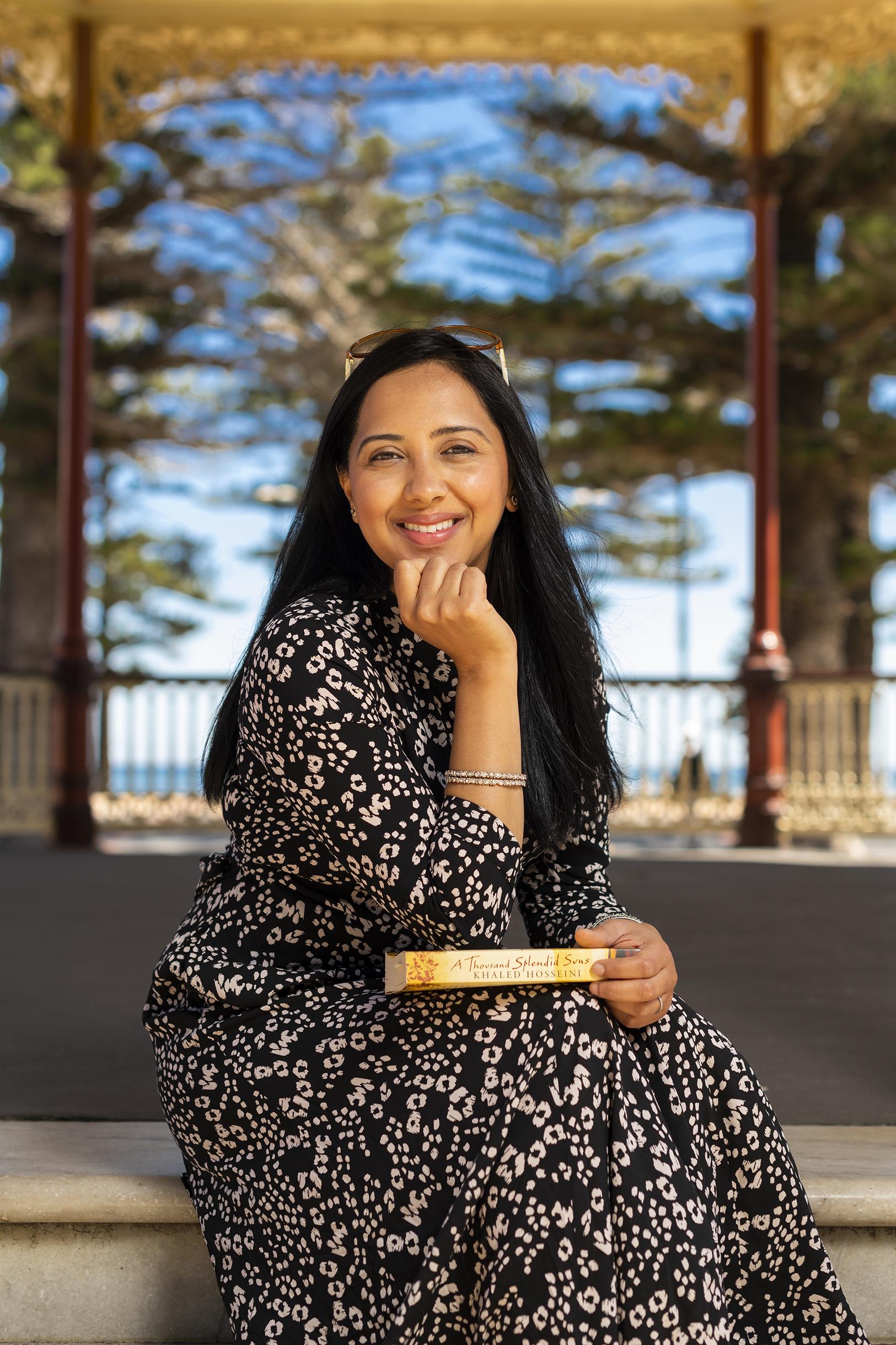Connected Conversations | Sanam Mustafa
Molecular pharmacologist, Superstar of STEM, and mother-of-two, Dr Sanam Mustafa never imagined a life in Australia but a chance meeting and unexpectedly finding love brought her to Adelaide. Among her many achievements, Sanam is also a passionate advocate for gender, equity and inclusion, with hopes of continuing the empowerment of women in academia.

Please tell us a little bit about yourself.
My name is Sanam Mustafa — I’m a mum to two little girls (five-year-old, Zaina and eighteen-month-old, Arina). I was born and raised in Bonnie old Scotland and moved to Perth, Western Australia in 2009, before coming to Adelaide in 2012. My move to Australia was meant to be a temporary one but I met my husband as I was planning to head back and now Adelaide is home and the rest is history.
For the past seven years, I’ve been lucky to be part of the ARC Centre for Nanoscale BioPhotonics (CNBP). It has been a wonderful experience and has allowed me to develop into the researcher that I am today — a molecular pharmacologist with a twist! I like to take a multidisciplinary approach to my research, so I work closely with physicists, chemists, engineers and psychologists who let me test out their new technologies and equipment. This lets me push the boundaries of my research and tackle problems from new perspectives with exciting tools and the support of a great team!
I’m a passionate advocate for gender, equity and inclusion and I’m on the board of aKIDemic Life (an online resource to help academic parents navigate through the challenges of parenting and a career in academia) and I am also member of a number of committees such as the Faculty of Health and Medical Sciences GEDI committee as well as the Science & Technology Australia’s (STA) Equity, Diversity and Inclusion committee.
In 2017, I was named one of STA’s inaugural Superstar of STEM and this has empowered me to lead and represent my peers at executive levels in and outside the University, including as Vice President of BliSS Science and Innovation Inc. and Chair of BLiSS*Adelaide Chapter – a non-profit organisation fostering and enabling multidisciplinary collaborations.
What was your first area of study and what drew you to this space?
I was lucky to have some wonderful biology teachers at school who made science fun and relevant. They really brought textbooks to life. We always had hands-on demonstrations, videos and interactive study sessions. It inspired me to study science. I was fascinated by genetics and the secrets that could be uncovered by studying DNA so I applied for a genetics degree at the University of Glasgow.
What has been your journey to get where you are today?
Growing up, I didn’t have any academic role models, but my mother has been, and is, my biggest inspiration. She taught me nothing is beyond reach if you have passion. If you are determined, then you can create opportunities for yourself. My mother actually wanted me to study medicine and be a doctor. she wanted me to be in a profession where I could help others. This really resonated with me but I realised early on that medicine was not for me and I could make a difference through research instead.
I chose to study genetics at an undergraduate level and, when I had the opportunity to train with one of the most renowned molecular pharmacology groups in the world, I decided this would only enhance my existing skillset and I embarked on a PhD. Australia was not on my radar, but a chance meeting and unexpected job offer took me to Perth, Western Australia.
After our marriage, my husband and I planned to move to Melbourne, where I had secured a position. However, due to the care of my elderly parents-in-law, we changed our plans at the last minute and I ended up in Adelaide without any networks or leads. This was a major challenge, but my path led to Professor Mark Hutchinson who believed in me and valued my skillset. Fast forward to now, Mark’s been a great mentor and we are still working together on exciting projects.
During my time at the University of Adelaide, I have had the opportunity to identify new, exciting areas of research that expand on my training and experience. I now work with researchers from diverse disciplines and my research is applicable from the medical to agricultural, sports and even defence sectors. In 2019, I received the Faculty of Health and Medical Sciences’ Executive Dean’s Medal for Engagement & Advancement for engaging with Defence Science and Technology Group and advancing the reputation of the University.
What are you working on now?
- My primary research focus is around pain but this takes many forms.
- Using a light-based method developed by collaborators, I am developing a test to determine how much pain someone has, just by examining the colour of their blood.
- Cells and proteins are often decorated with ‘sugars’. I am investigating if these sugars can impact how opioids work and if I can translate this knowledge to design safter and more effective pain management therapies.
- My research is also focused on understanding how the immune system can control human behaviours such as addiction, resilience or even performance.
- One in five Australians are affected by pain and it is the single biggest reason patients consult their doctors. The best treatment we have for pain is morphine, an opiate. However, its use comes with many problems and side effects, like constipation, addiction and, in some cases, more severe pain. With the last drug developed over 20 years ago, there is a concerning lack of progress.
- Children, and even the elderly, can really struggle to communicate their pain. If a simple blood (or saliva) test could pinpoint their pain and mean they receive the urgent care they need, then that would be a wonderful result. Beyond that, safer medications that don’t result in addiction would make an incredible difference to someone’s life, maybe even impact a whole family or community. These are the things that motivate and excite me.
What do you love most about working at the University of Adelaide?
I love working with my colleagues and the friendships that have developed through collaborations, seeing the enthusiasm of the students that pass through our labs and then onto amazing new adventures. I love the buzz of brainstorming research challenges and then seeing the data come through. I still get goosebumps while I eagerly wait for the plate reader to finish a read or waiting for colleagues to share new data! I really enjoy the collaborative and nurturing environment that I am part of. I am thankful that #KindnessInScience does exist and I see it every day.
What opportunities do you see for the future?
I think the future is all about multidisciplinary research and collaboration. Talking to new people opens the mind and many doors of opportunity. It’s a matter of being receptive and pushing your own comfort zone onto greener pastures!

What are the top three most defining moments of the past year for you?
- Organising the BLiSS*Adelaide 2020 Virtual Conference during a pandemic and while on maternity leave! This taught me about embracing change and being agile!
- Being appointed as the BLiSS Science & Innovation Vice President. I’m very excited to be taking on this leadership role at the national level. I’m excited to help early and mid-career researchers realise their research potential and answer the big research questions through multidisciplinary collaborations.
- Returning to work as a mum of two! Life has changed remarkably, and I am excited by the opportunity to be a positive role model to my daughters and perhaps inspire them, just as my mother inspired me.
What do you like to do in your spare time?
As a mum of two young children and no family support, I don’t have much spare time. I love to spend my evenings and weekends with my family. Together we love to bake, cook, go for walks, read books and do lots of role playing!
How do you relax or switch off?
I have a mild addiction to Pakistani dramas! I also love a great thriller or comedy. I don’t read for pleasure as much as I used to so that is something I want to change this year.
Which destination is at the top of your list of places to go when international travel returns to normal?
My extended family is in the UK. I was very lucky that they visited just before the pandemic started but not knowing when I will see them next is unsettling. When international travel returns, the UK is on the top of my list. I am looking forward to seeing my parents, brothers and finally meeting my niece!
